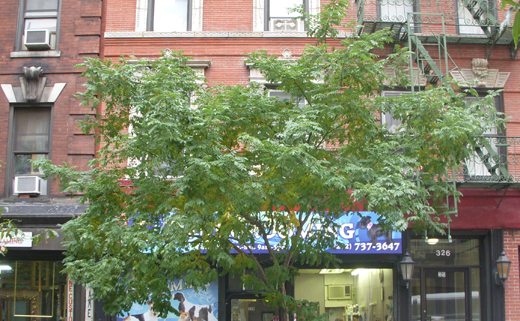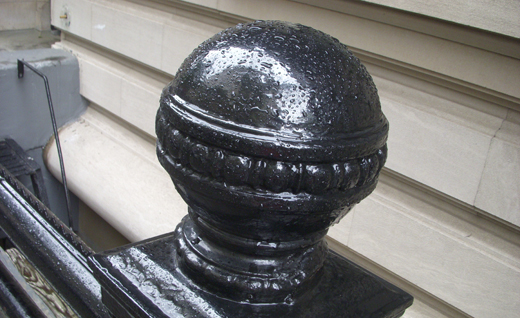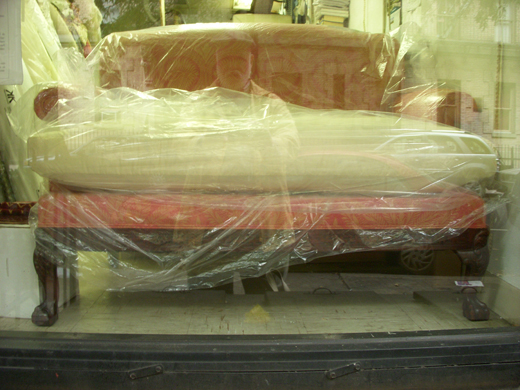Office/Diary: Thursday

Nothing of interest happened today. My brain felt a bit more like cottage cheese, and worked almost as badly. Happily, it was not called upon to do much of anything.
¶ Matins: Forget taking someone out to dinner and spending a few hours across a white tablecloth, making conversation. Don’t even bother dressing up. Foraging is the new dating game, and you may have to eat something strange and new. (NYT)
The greater part of the afternoon was spent printing Dymo labels, pasting them onto CD sleeves, breaking down jewel boxes (slipping CDs into sleeves and removing all the “art”), and throwing the plastic away. It doesn’t sound like much, but in the time that it took me to process about 150 CDs, I listened to all of Weinberger’s Schwanda, all of Don Giovanni, and the finale of Tannhäuser. And then I listened to nothing. I listened to nothing for almost long enough to play yet another opera. Laziness had little to do with my not playing yet another opera.
¶ Lauds: Lawrence Pollard reviews some of the more outrageous cases of vandalizing artworks, and ponders Pierre Pinoncelli’s claim that sometimes it’s the destruction of a work of art that’s the work of art. (BBC)
The idea, of course, is to save room; at least three CDs (and their attendant paperwork) will fit in the space occupied by one jewel box.
¶ Prime: Why does the Windows 7 upgrade cost so much? (And take forever to install?) Because, Bob Cringely says, Microsoft doesn’t want you to buy it. (I, Cringely)
In the morning, I had an insight about the future of the Daily Office. It was more of a vision, really; I could see how things would be. Will be, when I return to regular programming after my birthday. I may ease into it in the mean time. Watch for sneak previews.
¶ Tierce: Choire Sicha swoons over samurai. “Hello, Volcano Coat!” Those who forget history may be doomed to wearing it. (The Awl)
In the afternoon, I made the mistake of answering the phone. I was in no shape for a phone call, and my friend, not surprisingly, thought that I was angry and short. I didn’t think that I was either, but I knew that I was very impatient, and I was impatient not with my friend but with the very idea of talking. I could not support conversation in my current state of fatigue.
¶ Sext: Nell Boeschenstein rewrites “Breakfast at Tiffany’s” for the Teens: it’s real-estate listings that fire her dreams, not diamonds. Beneath the humor, a poignant piece about the heartbreaking unattainability of truly desirable housing. (The Morning News)
My friend asked me why I was so tired, and how was I tired. Was it mental, physical? I’d say (although this didn’t occur to me on the phone) that it’s existential. As I said the other day, I’m often sick of life these days; I’ve had a surfeit. I can only take so much existence. Especially when existence involves moving shopping bags from one side of the room to the other, in order to make space for boxes. Oh, and I am no longer 30.
¶ Nones: Michael Clemens disputes the “brain drain” scenarios that developing countries often complain about. More Philippine nurse in the United States, for example, means that are more nurses in the Philippines than there are in Britain. (Foreign Policy, via Marginal Revolution)
What I’m engaged in is not your ordinary household project. I’m cleaning out the place for the rest of my life, acknowledging that many of my possessions are no longer necessary. Which possessions? If only it were a matter of drawing up a list. I don’t really know why it isn’t a matter of drawing up a list, but I know that it isn’t.Â
¶ Vespers: Tom Nissley interviews NYRB Books editor Edwin Frank, and notes that his sponsor, Amazon, will sell you a full set of the imprint’s offerings at a thousand dollars off! (Omnivoracious; via Maud Newton)
Never mind what tomorrow may bring. Nay, will almost certainly bring. Friday, neither. Kathleen will be away for the weekend, so she’ll be spared the convalescence, which, as everyone knows, can be uglier than what brought it on.
¶ Compline: In a surprisingly brief entry, Jonah Lehrer cogently explains pleasure, beauty, attentiveness, idealism, and appetite in terms of a common denominator: dopamine. (Frontal Cortex)
The day would have ended a lot more pleasantly if the clown who works relief on Wednesdays in the package room hadn’t decided to close up shop on the early side, without letting anybody know. I went downstairs at 7:30 — the package room closes at 8 — clutching three package slips and the agreeable anticipation of reclaiming a piece of dry cleaning. Upon encountering the locked door, my blood ran toxic with frustration. I was too far gone for anger.
Thank heaven for Quatorze!
















